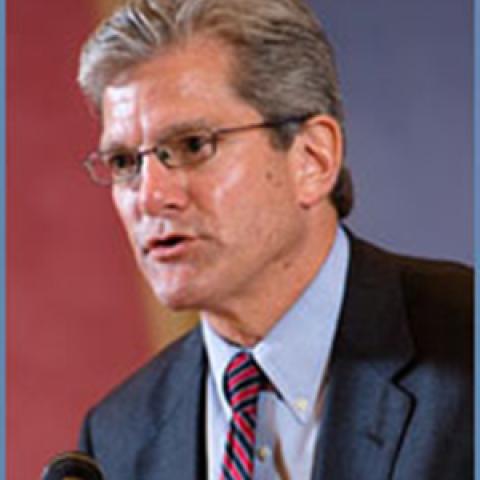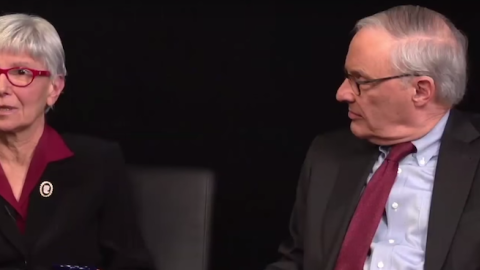__Hudson Senior Fellow Amy A. Kass passed away on Wednesday, the 19th of August, 2015 after a valiant battle with cancer. Her death leaves an unfillable void at the Institute, we mourn her loss, and we extend our deepest sympathies to her family. The following is a personal tribute to Amy by her longtime friend and colleague, Hudson Senior Fellow William A. Schambra. He speaks for us all.__
When Amy Kass joined Hudson Institute in 2005 after a career as an award-winning teacher at the University of Chicago, she quickly lifted her colleagues out of the arid world of public policy analysis and into the vivid world of story.
Story in all its forms—compelling short fiction, inspiring historical and biographical tale, soaring poetry, speech and song—lay at the heart of Amy’s imaginative, fruitful and unique work at Hudson: the Dialogues on Civic Philanthropy that resulted in Giving Well, Doing Good: Readings for Thoughtful Philanthropists; the collection of readings on American character and citizenship that became What So Proudly We Hail: The American Soul in Story, Speech and Song, co-edited with her husband Leon Kass and Diana Schaub; and her skilled moderating of the first half-dozen annual Bradley Symposia, as well as discussions of a classic Christmas story each holiday season.
Amy understood that if we seek to become or to make better human beings, citizens, or charitable givers, more than cultivation of the mind is required. That work involves an engagement of the heart, as well—something best achieved not through the typical think tank output of policy analysis or political commentary, but through individual and collaborative contemplation of stories: the most thoughtful and artfully conceived stories our fellow men and women have produced as they struggle for purpose and improvement amidst civic turmoil, moral confusion, or spiritual crisis.
Stories like these arise from, define, and bind us together as families, communities, and nation. They tell us who we truly are, and—without doing violence to that fundamental nature—what more we might still be. Stories alone rarely if ever capture the whole of such truths, of course. But they remain necessary to us just the same, we ignore or dismiss them at our peril, and we must constantly reexamine and revivify them in order to preserve a central place for the human heart in our private and public lives.
In a city enamored of grandly self-assured and transformative strokes of Policy, Amy’s approach provided a sobering counterweight. No matter how ingenious a scheme of reform, no matter how clearly delineated its good guys and bad guys might appear, Amy’s writings and seminars reminded us that human nature is by no means so plain, predictable, or pliable. When reason claims a firm and perfect grasp on virtue and vice, the discerning heart resists, understanding that real human beings are perplexing admixtures of all-too-rare virtues and all-too-common vices. When our otherwise admirable temptation to change and improve risks hubris, the heart calls us instead to humility, moderation, deference, generosity, and charity. As Amy always taught, the rights answers are fine, but it’s the right questions that are vital.
A room with Amy Kass in it was something scarce and precious in the nation’s capital: a place where people of all ages, professional backgrounds, and political points of view felt comfortable speaking their minds—and hearts. Here there were no snap personal judgments or facile political reactions. There was instead a demanding, spirited, authentic grappling with the complex and conflicted characters in the stories she so carefully chose. In her firm but gentle way, Amy insisted that we accord full respect to the human dignity of those characters and their struggles. She expected no less in our treatment of one another.
As a colleague, Amy was always ready to share her own story as well, anchored in the deep admiration and love she felt for her husband Leon, her daughters, and her granddaughters. We at Hudson were thus always made comfortable sharing our stories, in turn: our personal and professional ups and downs, and the ethical dilemmas and spiritual quandaries we confronted along the way. Amy was an unfailingly compassionate source of wisdom about such matters, as free of easy moralism or judgment with us as she was in every other aspect of her life and work.
The story of her final years, as she faced mortality with plainspoken grace and courage, will by itself be a lasting gift to us all. But there is so much more. As a proud and reflective practitioner of teaching, she will remain an indelible and inspiring presence to each of her many students, colleagues, and friends. Amy Kass taught us to be better people, better citizens, in a better nation. And she taught us well.




















